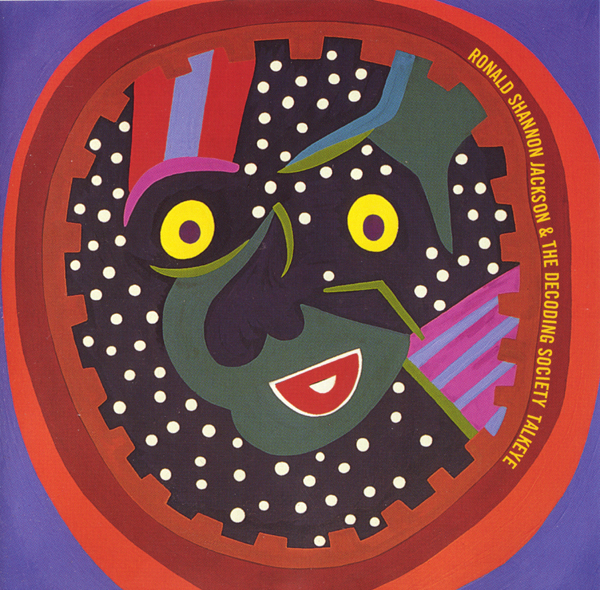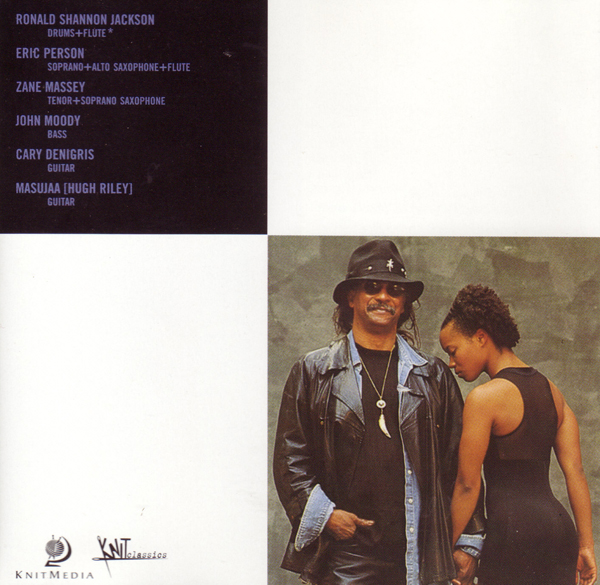RONALD SHANNON JACKSON






1/ Nothing Beats a Failure But a Try (Jackson) 6.00
2/ Holyman (Jackson) 5.25
3/ Panhandling (Jackson) 5.39
4/ Charming the Beast (Jackson) 3.18
5/ Evoking (Jackson) 8.00
6/ Shotgun Wedding (Jackson) 5.45
7/ Psychic Greeting (Jackson) 6.00
8/ Sheep In Wolf's Clothing (Jackson) 3.20
Recorded at January Sound, Dallas, Texas, April 9-11, 1987
Original engineer: Robert Wechsler
Original Assistants: Robbie Norris and Daniela De Stefanis
Mixed by Bill Laswell and Robert Musso at Quad Studio, New York City
Reissue engineer: Rob McCabe
Produced by Ronald Shannon Jackson and Bill Laswell
Reissue Producer: Jim Eigo
Executive Producer (reissue): Michael Dorf
Ronald Shannon Jackson: drums; Masujaa (Hugh Riley): guitar; Cary DeNigris: guitar; Zane Massey:
soprano and tenor saxophones; Eric Person: soprano and alto saxophones, flute; John Moody: bass.
1988 - Caravan of Dreams (USA), CDP85012 (Vinyl)
1988 - Caravan of Dreams (USA), 012 (CD)
2000 - Knit Classics/Knitting Factory (USA), KCR-3028 (CD)
Note: Bill Laswell does not play on this album.
Although Jackson has received some very positive critical reviews over the years, he hasn't exactly been embraced by the music industry or the casual listener, and has recorded for the most part on small, obscure labels. In part, Jackson has been a victim of his own chameleon-like complexity. His brand of harmolodic funk may have been a little too visceral, playful and nasty for both the highbrow Ornette Coleman intelligentsia and FM radio jazz-lite fuzak audience, but he is also too sophisticated and unpredictable for the funk/rock proles who just wanna shake their booties. So thanks to Knitting Factory's Knit Classics for bringing back nine (at last count) of Jackson's earlier recordings, most of which were initially recorded on the small and dormant (defunct?) Caravan of Dreams label associated with the Fort Worth nightclub of the same name.
Talkeye doesn't even show up on a couple of unofficial Jackson Website discographies [possibly because this was initially released as ‘Texas’ - DB], but it was recorded in April of 1987, less than a year after When Colors Play, and with the same line-up, ie, Jackson on drums and flute, Eric Person on soprano and alto saxes, plus flute, Zane Massey on tenor and soprano saxes, John Moody on bass, and the two guitars of Cary Denegris and Masujaa. At least one of the guitars is obviously MIDI'd, and it is occasionally employed to produce that fat, chordal synth sound which became such a jazz-fusion cliche in the 80's. However, the effect isn't overdone, and it's countered by some gritty playing by both horns and the second guitar. Like most Jackson sessions, this one has some subtle surprises, including the almost subliminal use of opera (?) samples in the opening "Charming the Beast," and the quite lovely and restrained "Holyman" and "Gandhi," the latter of which features Jackson and Person dueting on flutes.
As a member of Coleman and Ulmer's bands, Jackson learned his harmolodic lessons well. Several pieces on the CD (and especially "Jax's Dance) use multiple melody lines and time signatures, producing the disorienting, order-in-the-midst-of-chaos quality which can be so much fun for the listener to sort out (unless, of course, you like your jazz "lite").
Most pieces also display the characteristic rootless, tonal ambiguity of Coleman's music - you want to hum along, but can never quite figure out where the notes are going until you're already there. This edition of the Decoding Society also has strong echoes at times of the Mahavishnu Orchestra, especially when Jackson and the guitar(s) lock together for some rapid-fire unison playing. But Jackson rarely tries to match Billy Cobham's speed, and his considerable power is more reminiscent of Art Blakey, especially in his heavy use of kick drum and his delight in dropping percussive bombs. I know I'm making Jackson sound like a real mish-mash (an updated Blakey, doing an Ornette Coleman harmolodic reprise, with a touch of Mahavishnu), but he integrates his influences well, and the music of his Decoding Society bands is distinctive, adventurous and still challenging.
Bill Tilland (courtesy of the Motion website)
For this explosive studio session, Ronald Shannon Jackson's Decoding Society plays mostly concise but rather crowded originals. Altoist Eric Person (also heard on soprano and flute) and guitarist Cary Denigris would later join Chico Hamilton's band. Also in the sextet are Zane Massey on tenor and soprano, guitarist Masujaa, bassist John Moody, and the drummer/leader. The Decoding Society (along with Ornette Coleman's Prime Time and later on Steve Coleman) showed what fusion and funk could have become if they had not become dominated by pop elements.
3 stars out of 5
Scott Yanow (courtesy of the All Music Guide website)